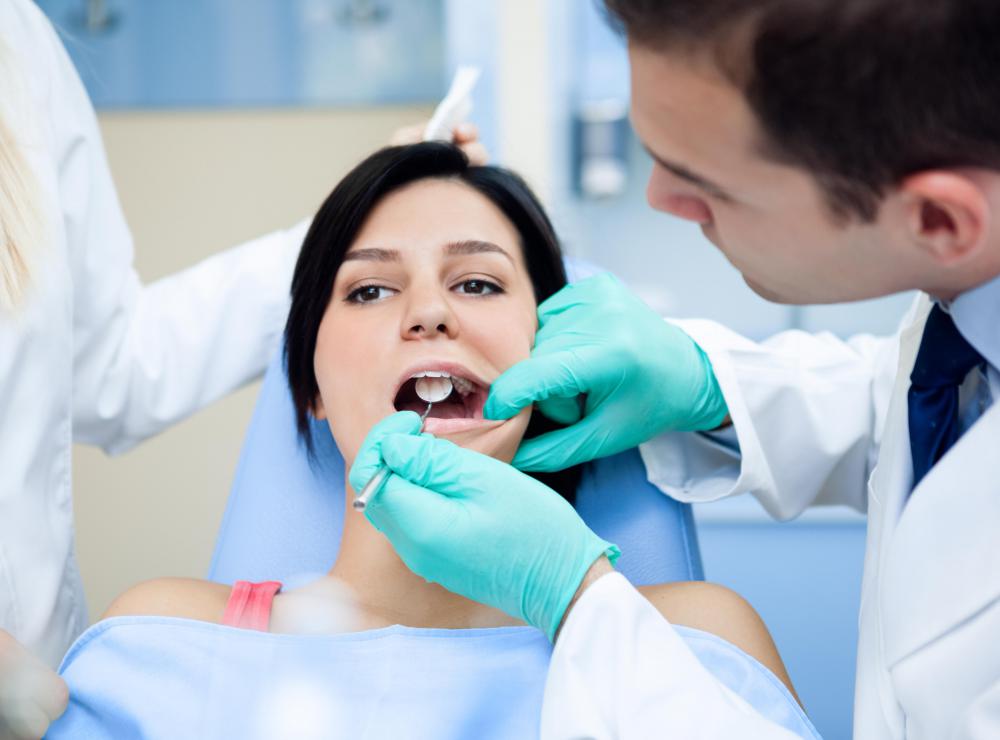At WiseGEEK, we're committed to delivering accurate, trustworthy information. Our expert-authored content is rigorously fact-checked and sourced from credible authorities. Discover how we uphold the highest standards in providing you with reliable knowledge.
What Is an Interdental Toothbrush?
Many companies make a variety of different sizes and types of interdental toothbrushes. These specially designed toothbrushes are used to clean between teeth where traditional toothbrushes cannot reach. Certain interdental toothbrush models can take the place of regular flossing. These small brushes are also referred to as proxy brushes or interproximal brushes. They can help prevent gum disease, tooth decay, and eliminate stains including coffee and tobacco stains between teeth.
An interdental toothbrush operates in much the same fashion as a traditional toothbrushe. Gently moving these brushes back and forth between teeth helps remove debris and plaque. They can efficiently clean around braces, other dental appliances, and implants without damaging any material in the process.

Bigger brush models are perfect for cleaning between teeth with larger gaps between them. Smaller interdental toothbrushes are used to clean between teeth with smaller gaps. These small models can be used for applications where dental floss does not easily fit between certain teeth. Tapered models are versatile and can be used to clean between teeth with large or small gaps. Interdental toothbrushes with soft filaments are designed for those with inflamed or sensitive gums.

Many of these brushes feature a plastic coated wire to hold the bristles. These wires are stiff enough to resist any bending and buckling that may occur while in use. They must also offer some level of flexibility however, to gain access into any awkward gaps.
Interdental toothbrushes are available in a variety of sizes and shapes, making them ideal for most in-between teeth cleaning applications. A person without good finger mobility may benefit from using a proxy brush that features an easy-to-grip, large handle. Certain models are engineered with adjustable heads, allowing these brushes to access the most difficult-to-reach areas in between teeth.

Many of the interdental toothbrushes available are reusable but cheap enough to discard after a period of regular use. An interdental toothbrush needs to be thoroughly rinsed with clean water after each use to discourage bacteria growth within the bristles of the brush. When the filaments on these brushes become too worn, the brush should be changed or discarded.

A person should contact his or her dentist for advice on choosing the proper interdental toothbrush. These devices should never be forced into a space between teeth. If a brush will not progress between a tooth with only mild pressure, a smaller proxy brush should be used.
AS FEATURED ON:
AS FEATURED ON:















Discussion Comments
I think that an interdental toothbrush is most helpful to people with large gaps between their teeth. I have small gaps and when I used an interdental toothbrush, I hurt my gums a few times trying to get the brush into the gaps. These brushes should not be forced into gaps between teeth. Either they go in or don't.
@turquoise-- Interdental toothbrushes are fantastic. I highly recommend them. They're usually avialable at stores and pharmacies. Like the article said, they might be called a proxy brush or something similar. Once you see one, you will be able to identify them easily. They are thin wires, with short bristles sticking out of the wire. They are sold with the handle and also in packs as refills. You will need to get the handle first and then you can buy refills after that.
A soft one should work just fine. Also, different interdental toohbrushes may have different widths, you might want to consider that as well when shopping for one.
I had never heard of an interdental toothbrush before but it sounds like just what I need. I have trouble flossing. It's especially difficult to get between teeth in the back of the mouth with floss. Moreover, floss doesn't remove stains and I do have some tea and coffee stains between the gaps that I would like to remove.
Where can I get an interdental toothbrush? Is it available at the pharmacy? And should I get a soft one?
Post your comments